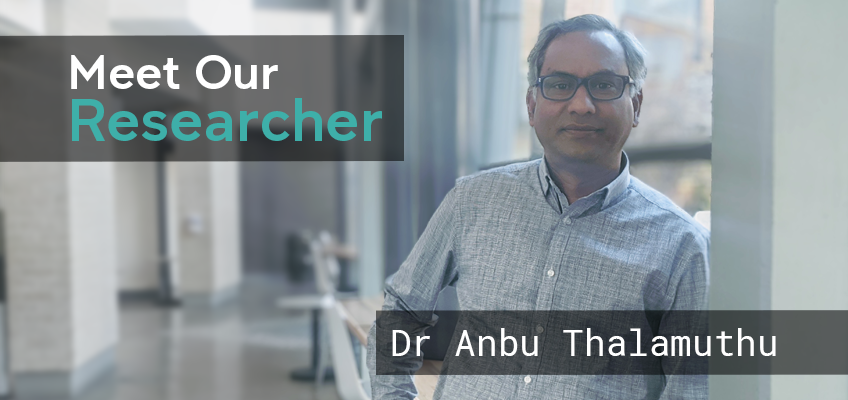03 Aug 2020

CHeBA’s Genetics & Epigenomics Group is primarily concerned with identifying factors defining healthy cognitive function, as well as physical and mental wellbeing. Dr Thalamuthu, one of CHeBA’s senior Research Fellows, is providing critical analysis of age-related phenotypes to achieve this goal, bringing us one step closer to improving quality of life across the lifespan.
How did you get into researching the ageing brain?
I obtained my PhD in Statistics from the University of Madras, Chennai in Tamil Nadu, South India. Being a statistician, I had the opportunity to work in several institutions in India and later in the USA and Singapore. Simply put, statisticians are generally required to apply statistics to solve practical problems in our modern data-centric world. A statistician is responsible for deciding what data is needed to be collected and how to collect that data; and then we analyse it and interpret it using specific statistical tools, algorithms and software. I joined CHeBA in 2012 – in the year the Centre launched - and hence my current focus is on age-related phenotypes which include disease burden, mental and physical health and overall wellbeing index. We are excited to study the genetic and environmental contributions to these phenotypes which ultimately lead to understanding of lifestyle changes and therapeutic interventions for healthy ageing.
Did you experience a ‘defining moment’ which led you to this field?
My general research interest is in applied statistics and my PhD thesis was focused on inference problems related to variance components models. I was working as a lecturer in the in the department of statistics at the University of Madras between December 2000 and January 2007. In June 2003, I attended a workshop on Genetic Epidemiological Methods for Dissection of Complex Human Traits which was held in Kolkata, India. I would say this was the defining moment in my career. In this workshop I was exposed to the statistical methods for the analysis of complex traits. I had the privilege of meeting Professor Daniel E. Weeks in that workshop, which led me to my postdoctoral fellowship under his mentorship. In October 2003 I commenced my postdoctoral fellowship at the University of Pittsburgh and from then onwards my research focus shifted to statistical genetics and, ultimately, that changed my career path. I am here because of my research experience in statistical genetics.
Do you have any personal interests or activities which are protective behaviours against cognitive decline?
Listening to Tamil music and watching Tamil movies are undeniably my two favourite hobbies. I am Tamilian - born in the Tamil region – and the tradition of Tamil music goes back to the earliest period of Tamil history.
I am certain music – both playing as well as listening - is good for the brain.
Apart from reading complex materials related to my work, I also enjoy reading Tamil novels and articles as its history is rich and fascinating. Social connectedness is also increasingly understood as being protective for the brain and I regularly talk to my friends here, in other countries and to my relatives over the telephone. I walk every day forty-five minutes to an hour. During this lockdown period I have been going for walks both in the early morning and evening.
What are you currently researching?
Being a statistician, I do not have my favourite phenotype. My research interests are on statistical methods for age related phenotypes. At CHeBA, my primary focus is on the analysis of big datasets and providing statistical including the computational support to many researchers at CHeBA.
Why is your research important?
The focus of my research within CHeBA’s Genetics & Epigenomics Group is on age related phenotypes. Specifically, we are interested in genetic, epigenetic, and environmental determinants of healthy ageing and exceptional longevity. We are looking at various factors that define the healthy brain, physical and mental wellbeing. We are optimistic about identifying factors that explain much of the variation in healthy ageing.
What do you love about working for CHeBA?
The CHeBA team is wonderful. All of my colleagues are very friendly people, truly multidisciplinary, and multicultural. Of all the places that I have worked so far, I would say this has to be the best work environment; I genuinely love being here.
What is the ultimate hope you have for your research?
My overall hope is that we find factors responsible for healthy ageing. We hope to get adequate funding support to collect all possible genetic data relevant for this research.
As the overall life expectancy increases all over the world, it is important that we live happily and healthily. I hope our research will add valuable insight for healthy ageing.
This interview was undertaken during the COVID-19 self-isolation period. Dr Anbu Thalamuthu found that positive thinking, enjoying his work, having video calls with his family and friends, as well as avoiding complaining, supported his mental resilience and kept him feeling socially connected while physically isolated.
Donations are fundamental for critical research to continue following COVID-19.
If you would like to discuss supporting Dr Thalamuthu's work specifically, or would like information
on leaving a legacy via a Gift in your Will, please contact h.douglass@unsw.edu.au.

Dr Anbupalam Thalamuthu is a Research Fellow working within CHeBA’s Genetics & Epigenomics Group. Dr Thalamuthu’s research focus is on the analysis of large datasets, such as those belonging to CHeBA’s longitudinal studies and age-related phenotypes. He obtained his PhD in Statistics at the University of Madras, Chennai. One of Dr Thalamuthu’s favourite hobbies is listening to Tamil music which engages him in novel ways outside of his research.
